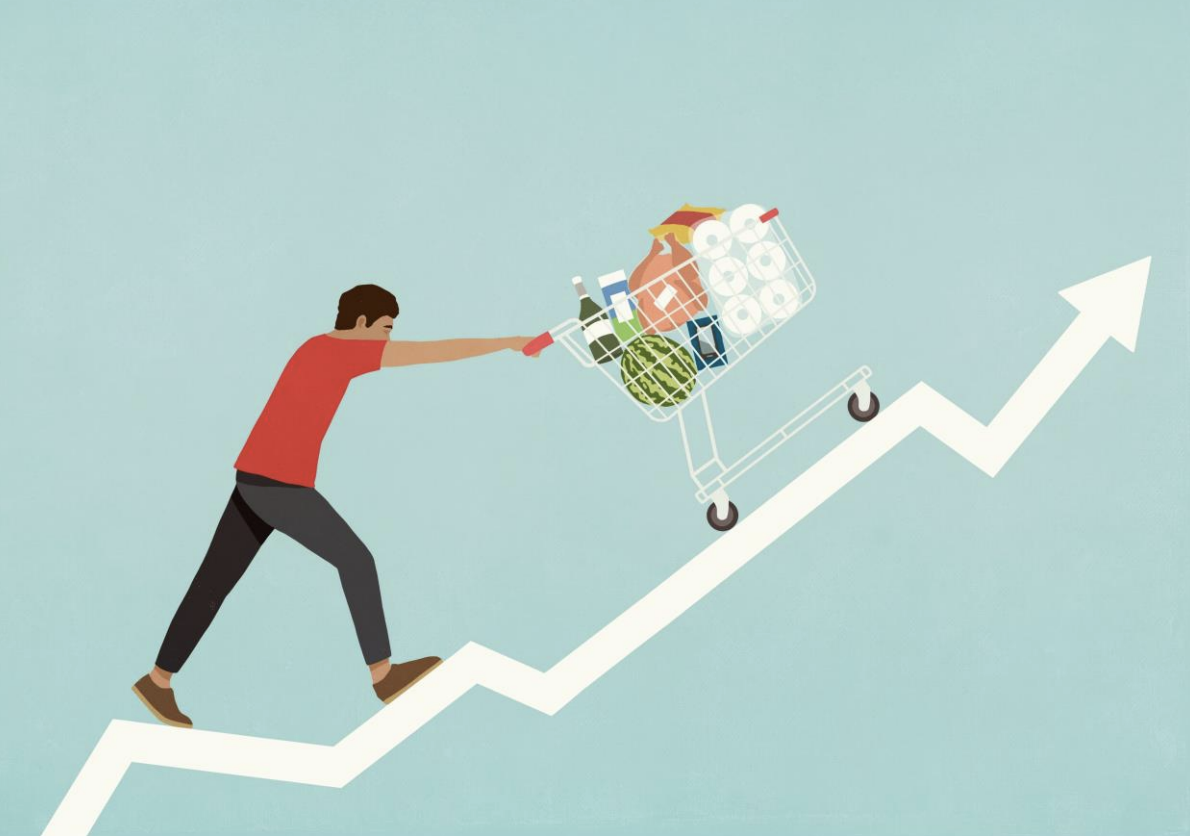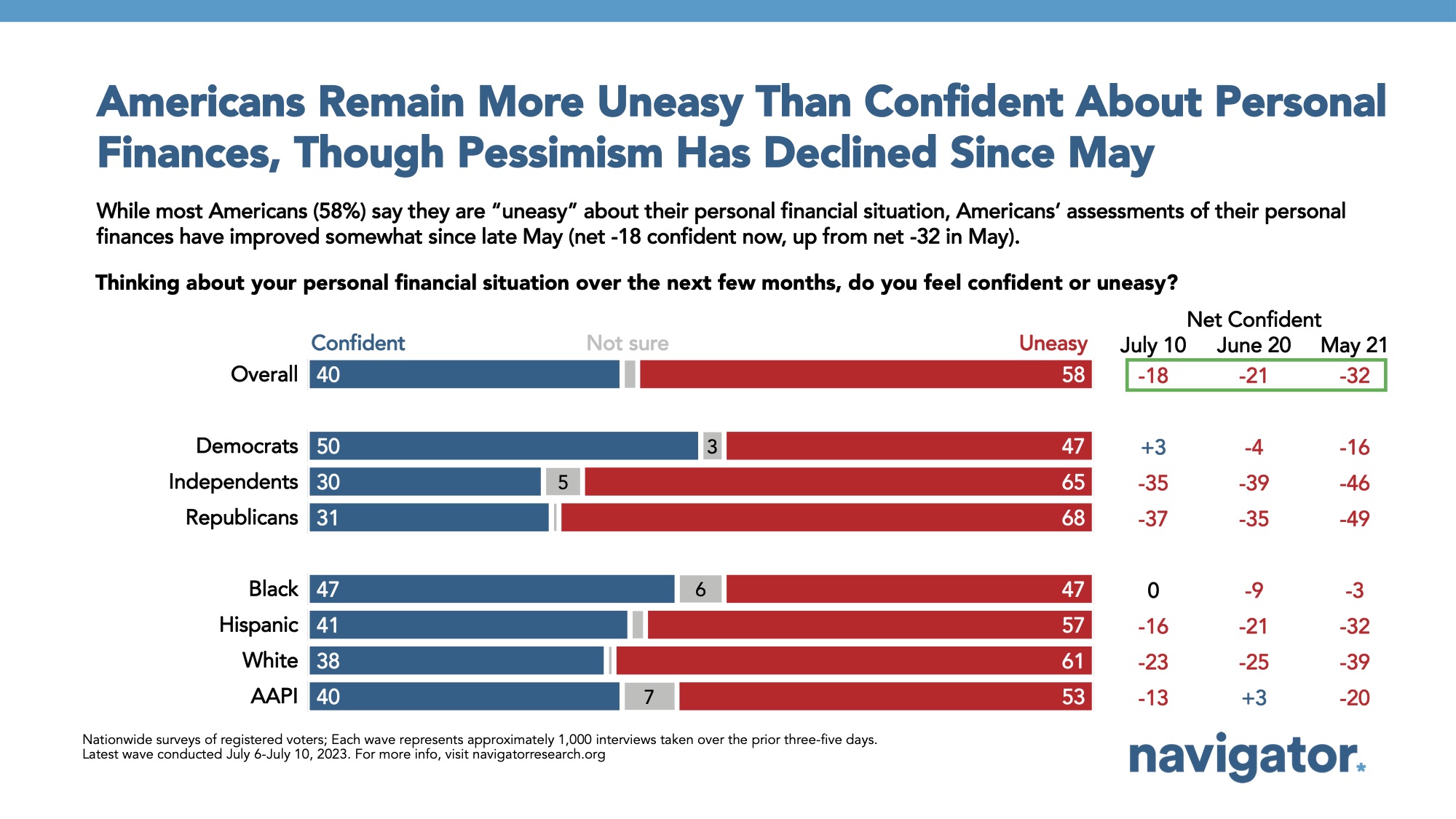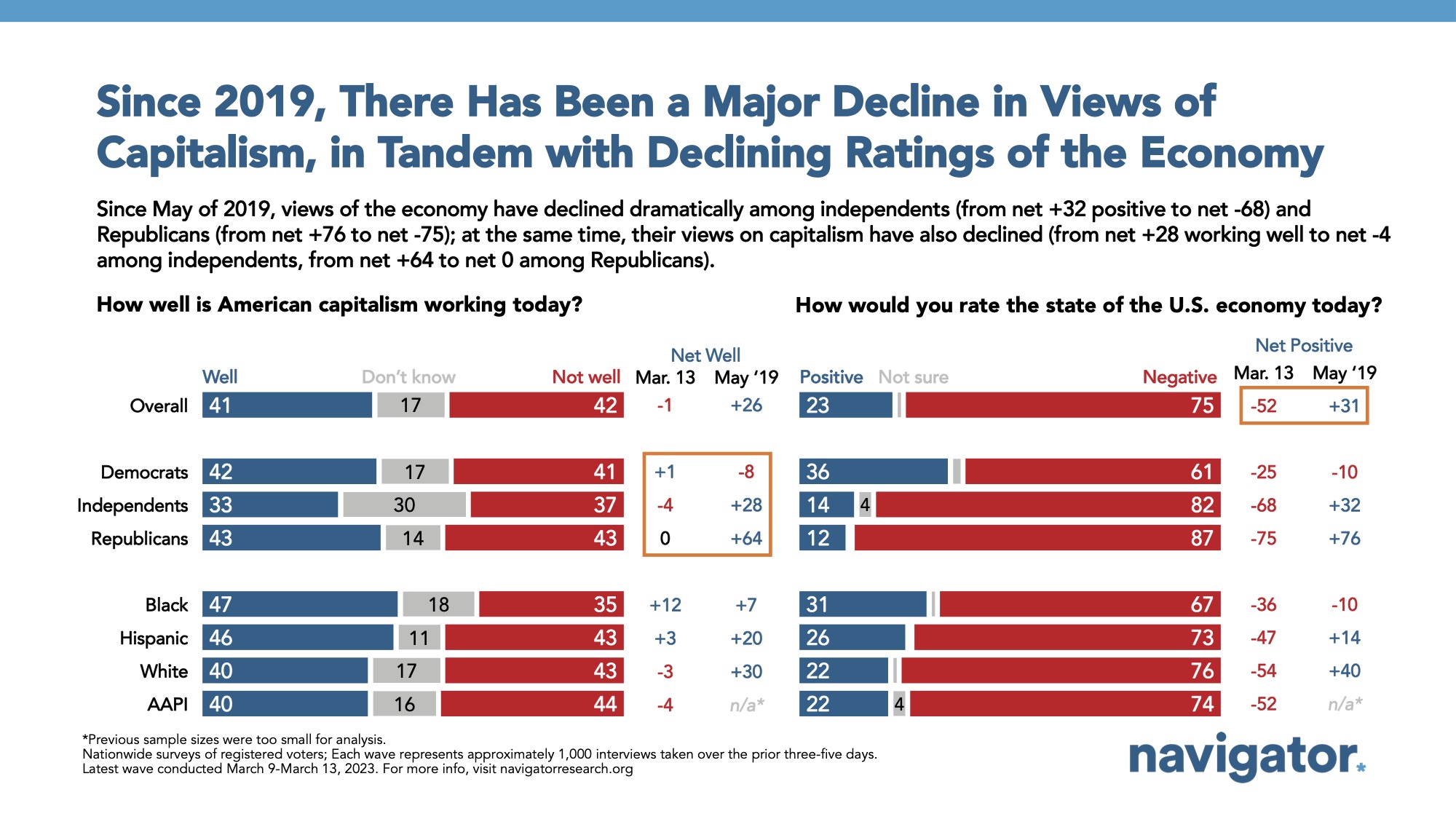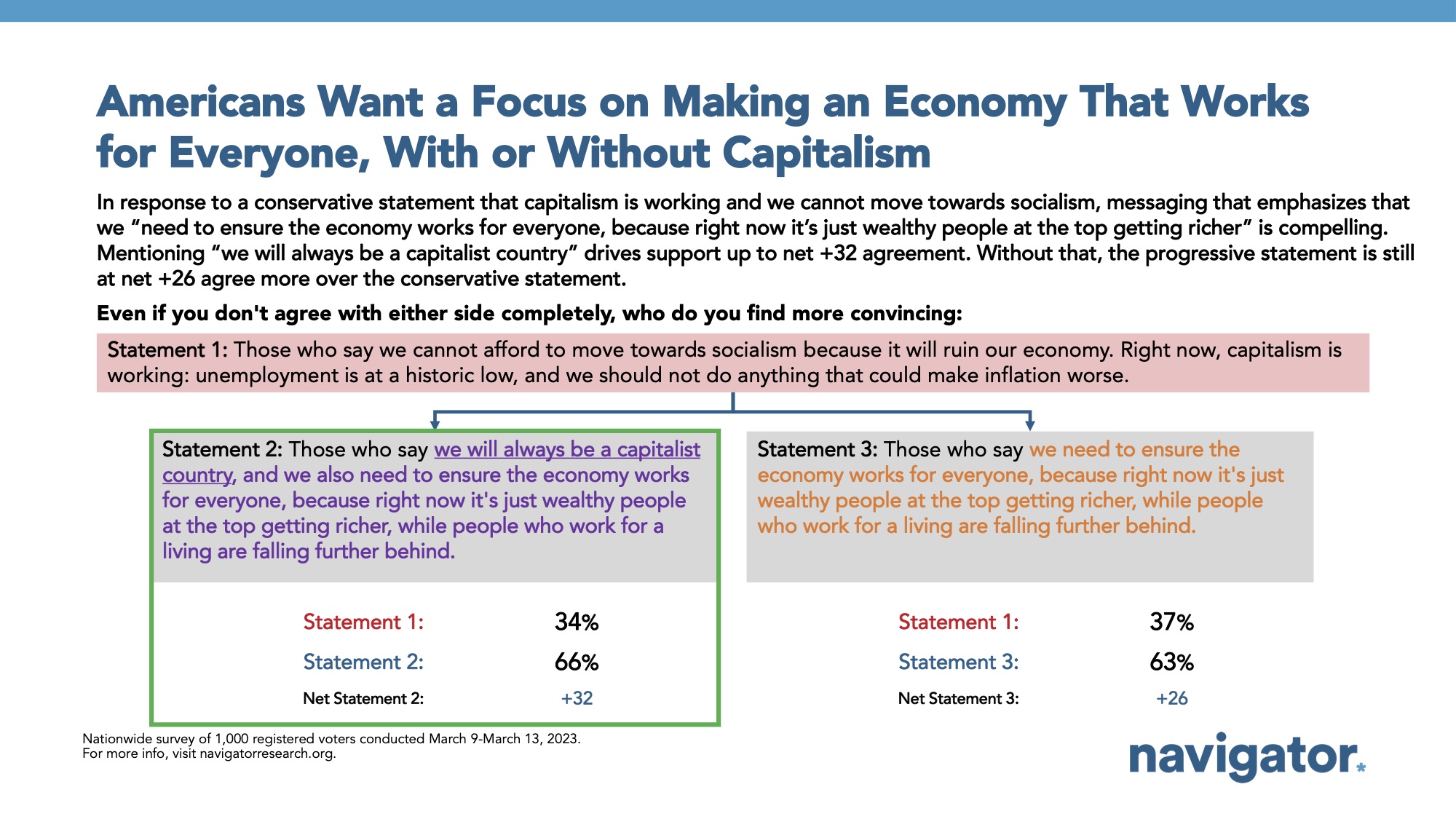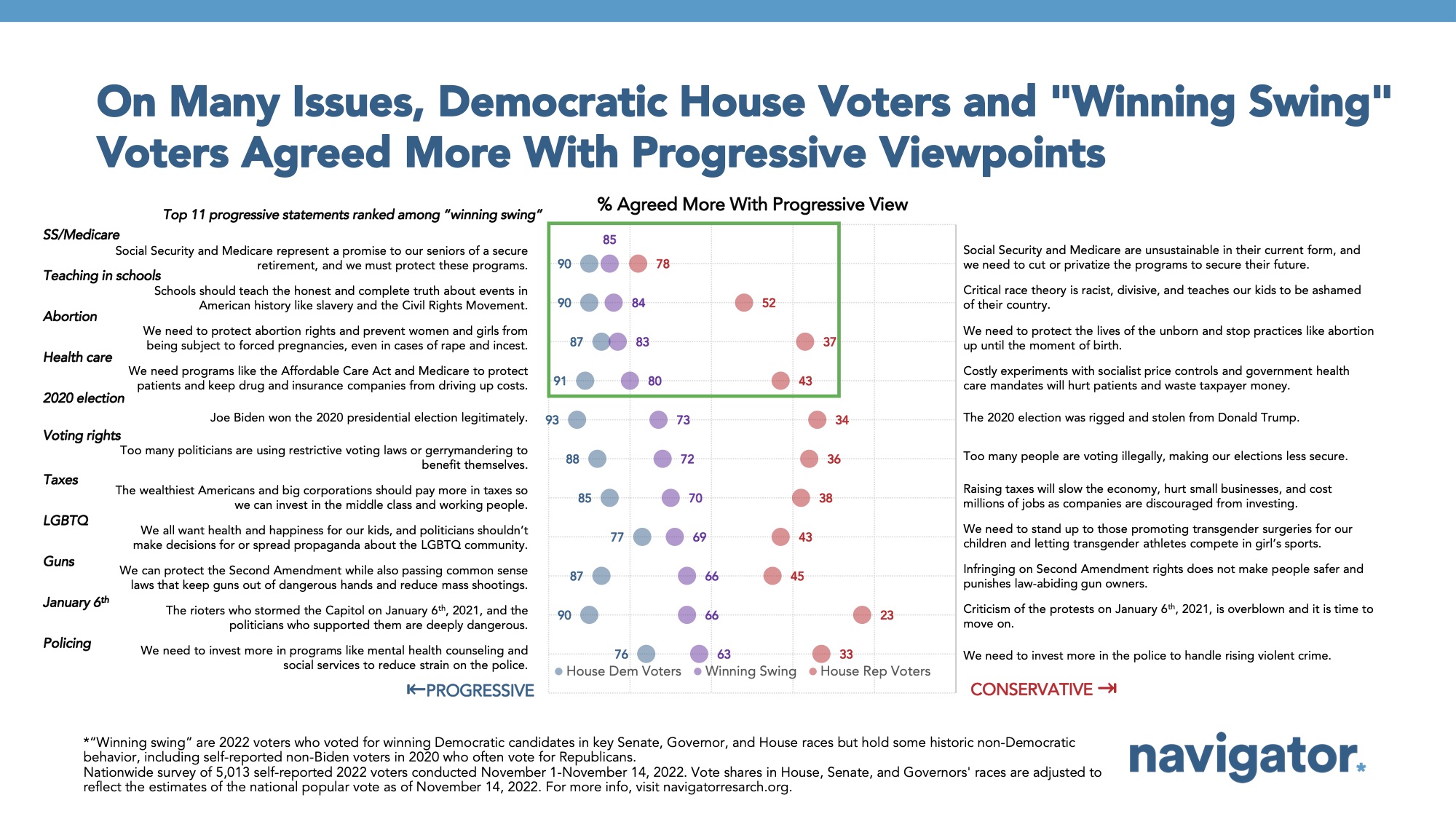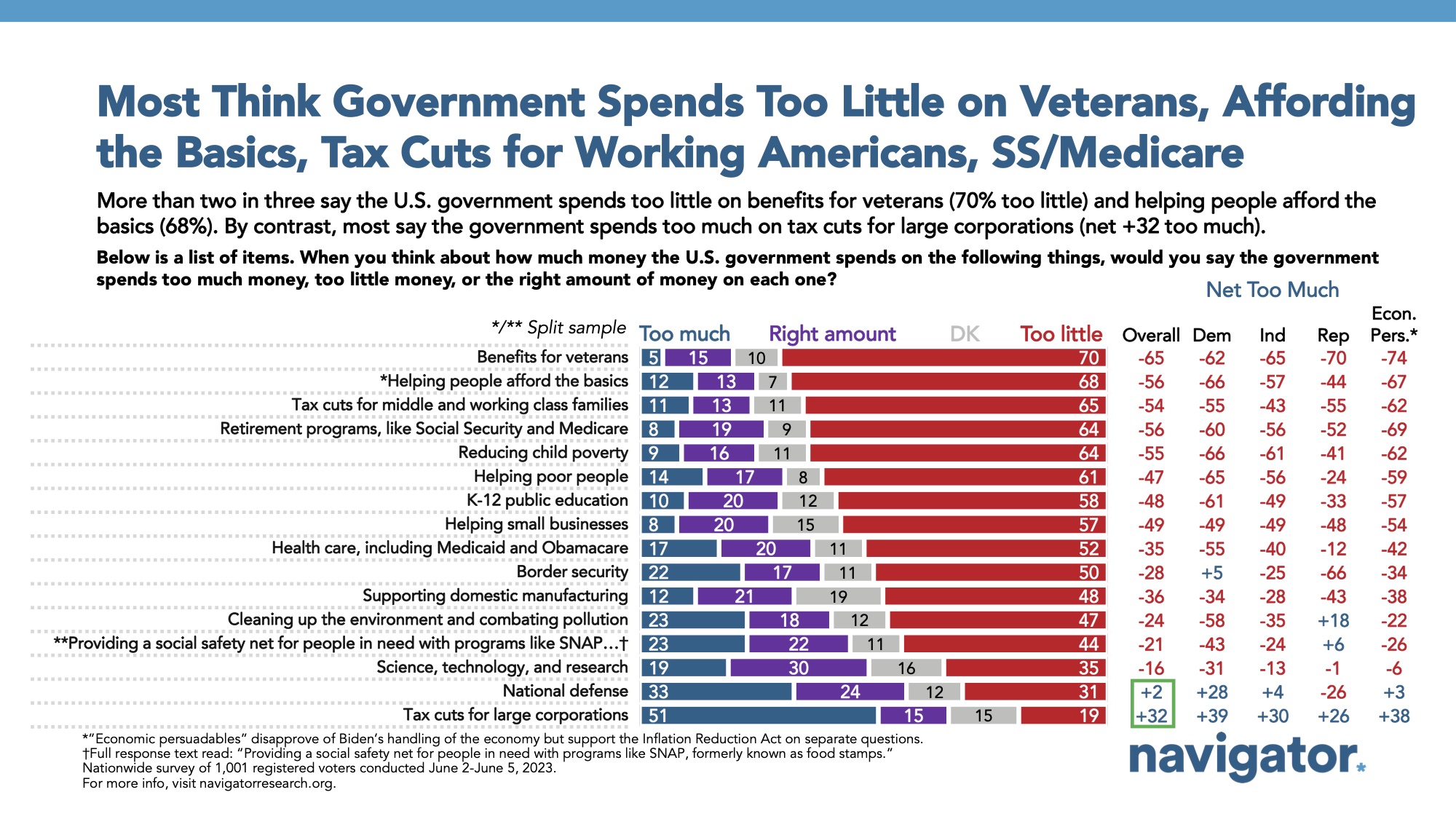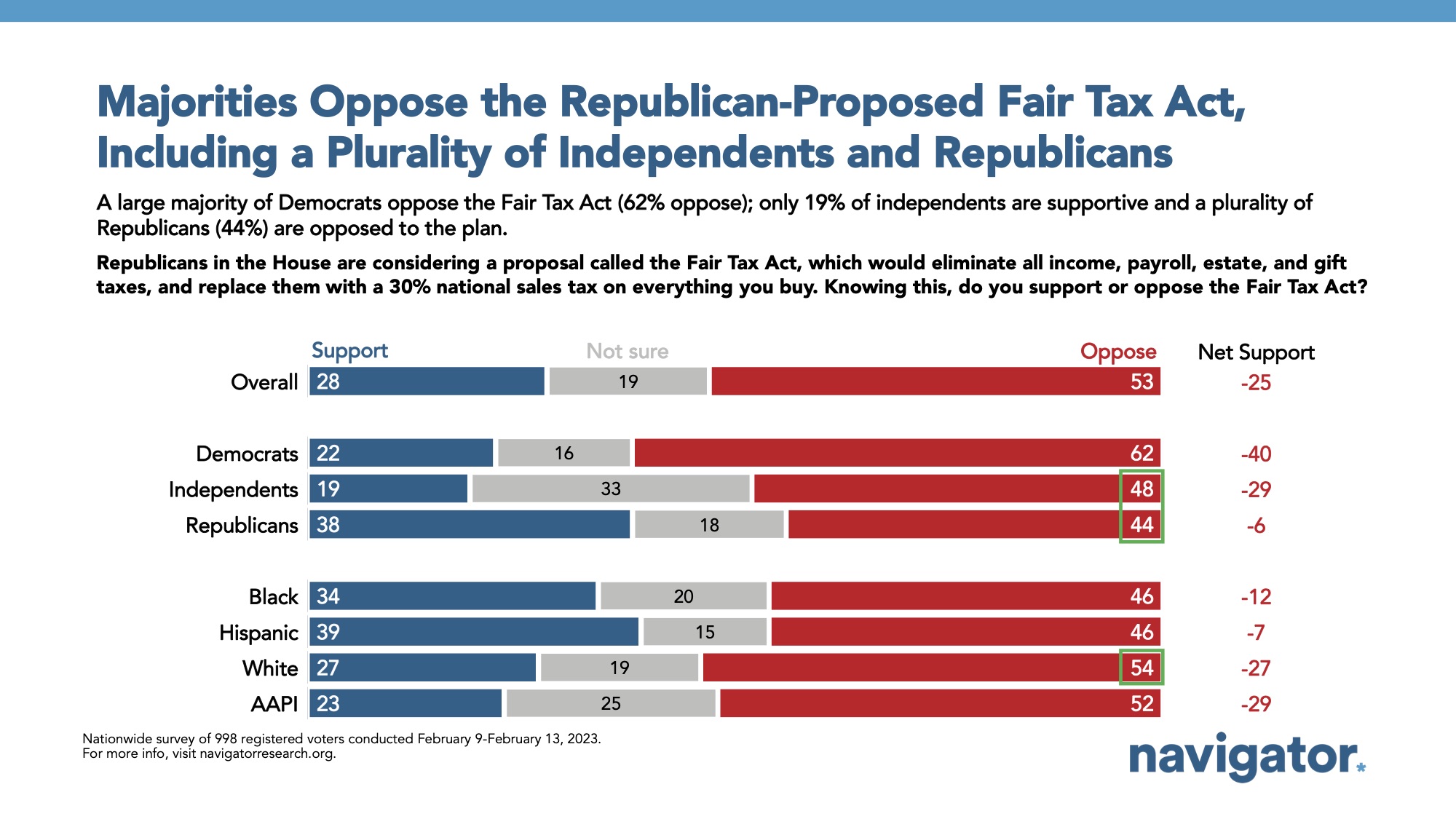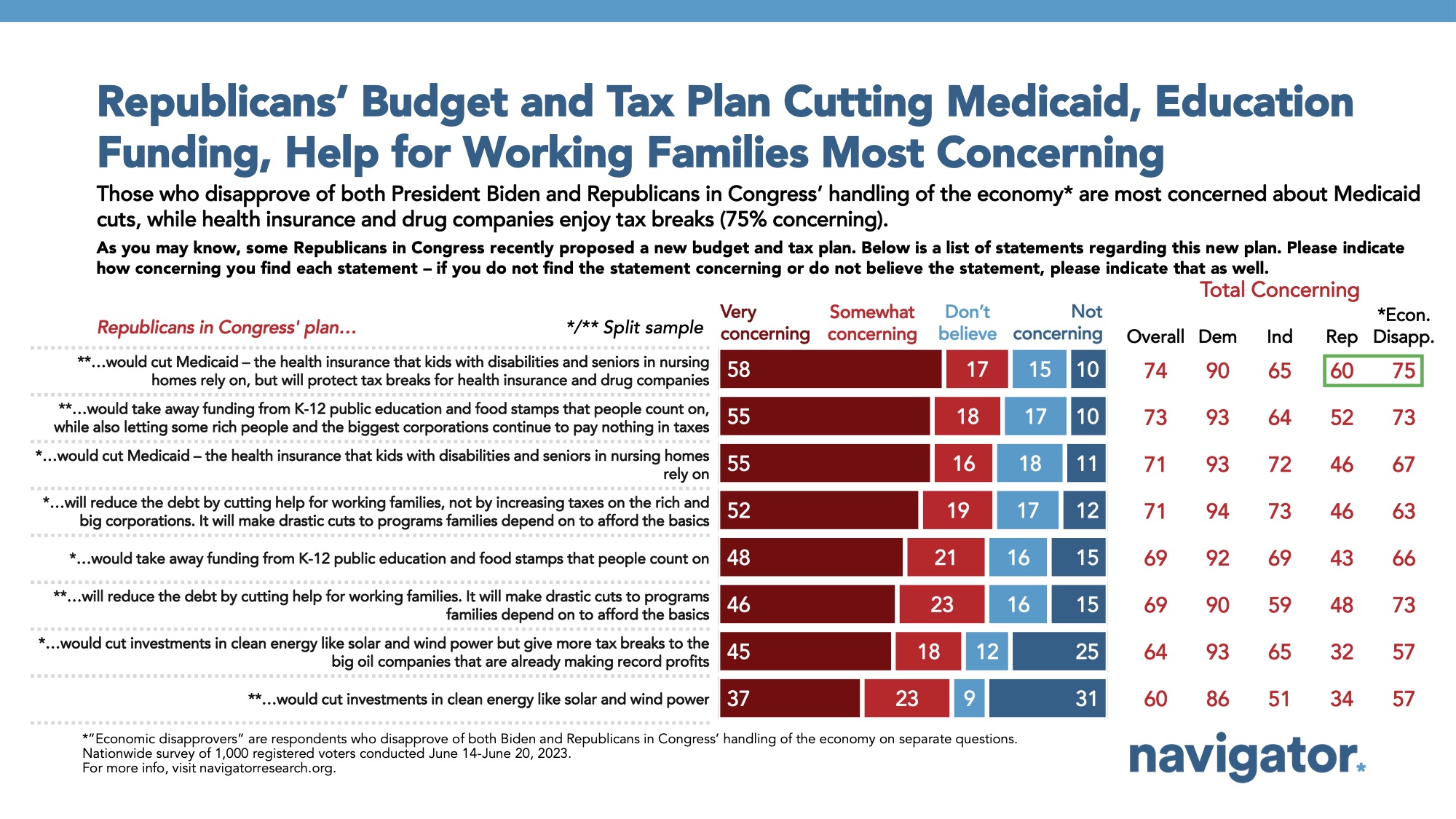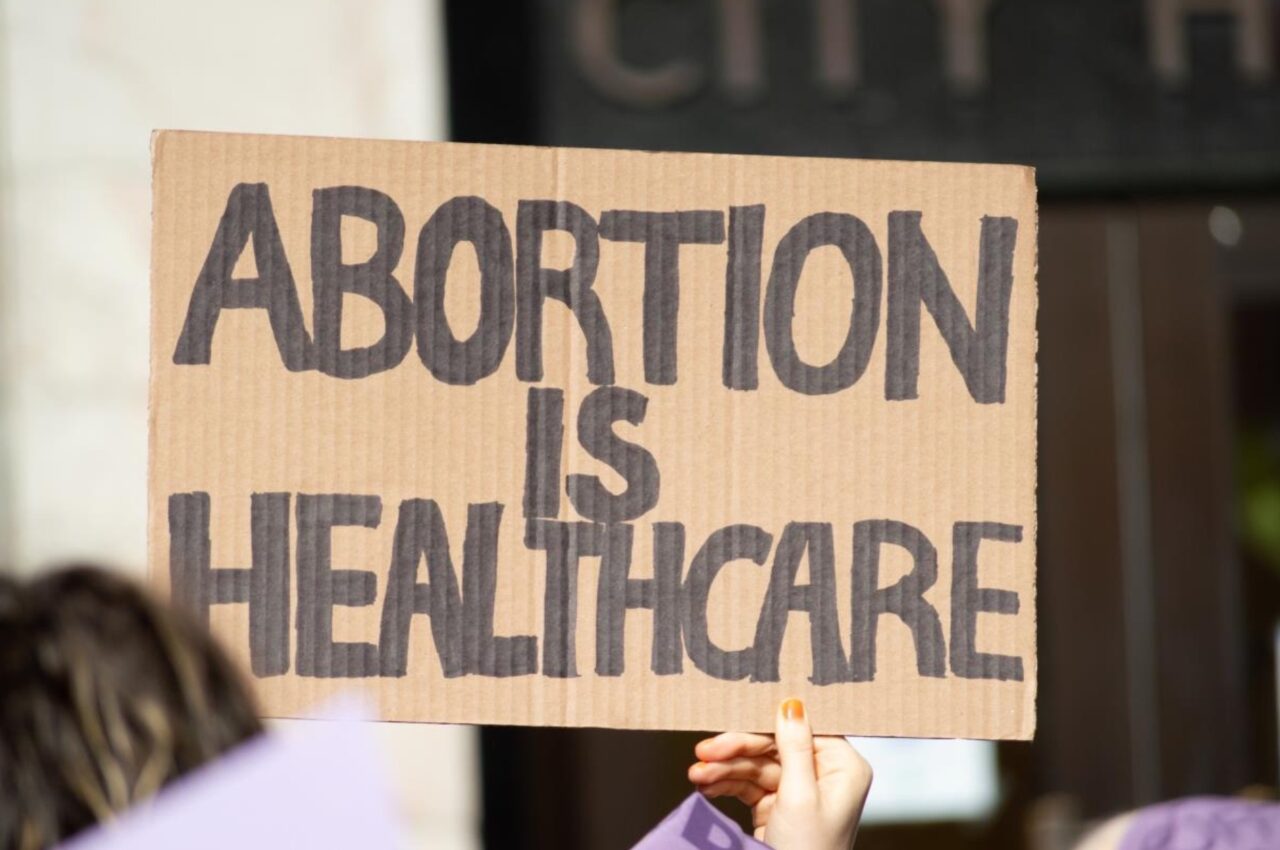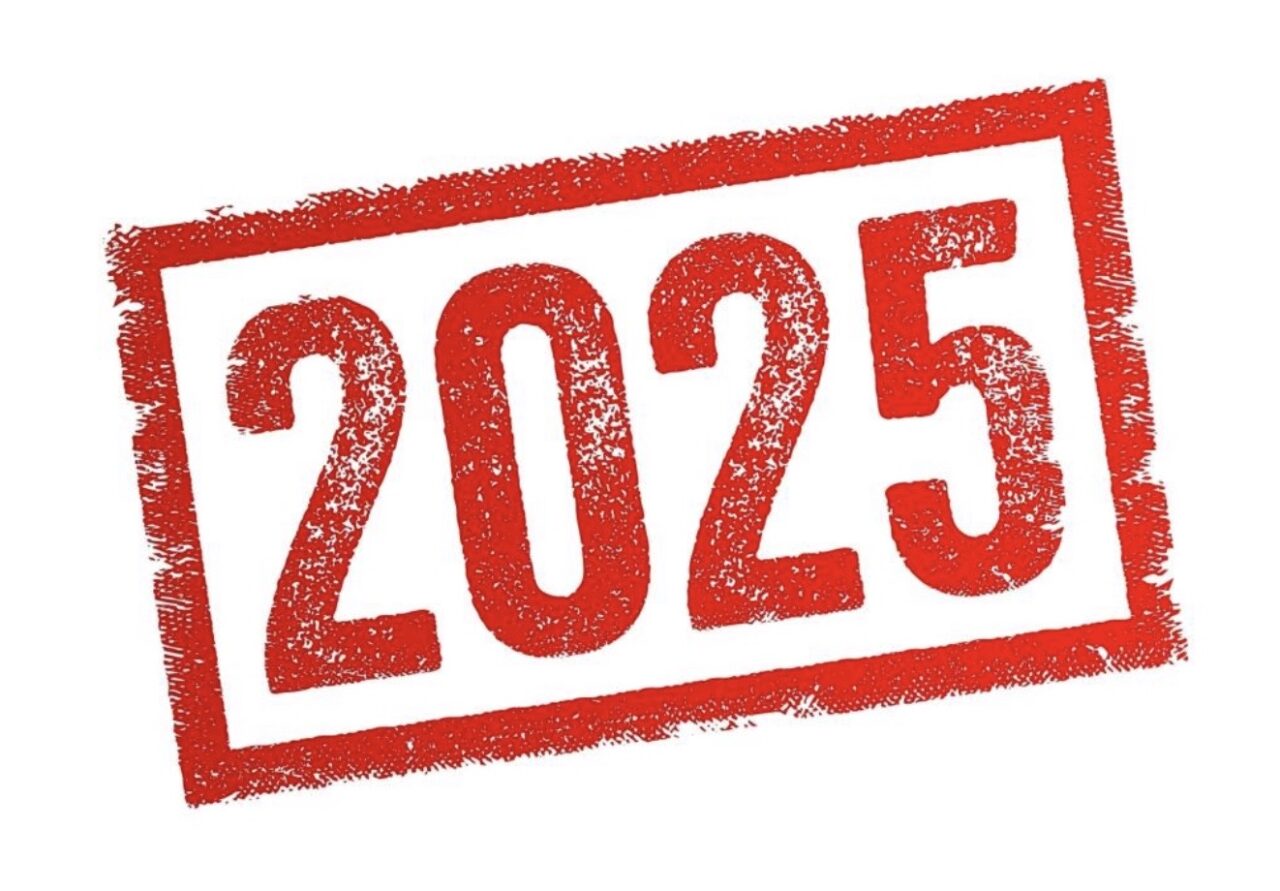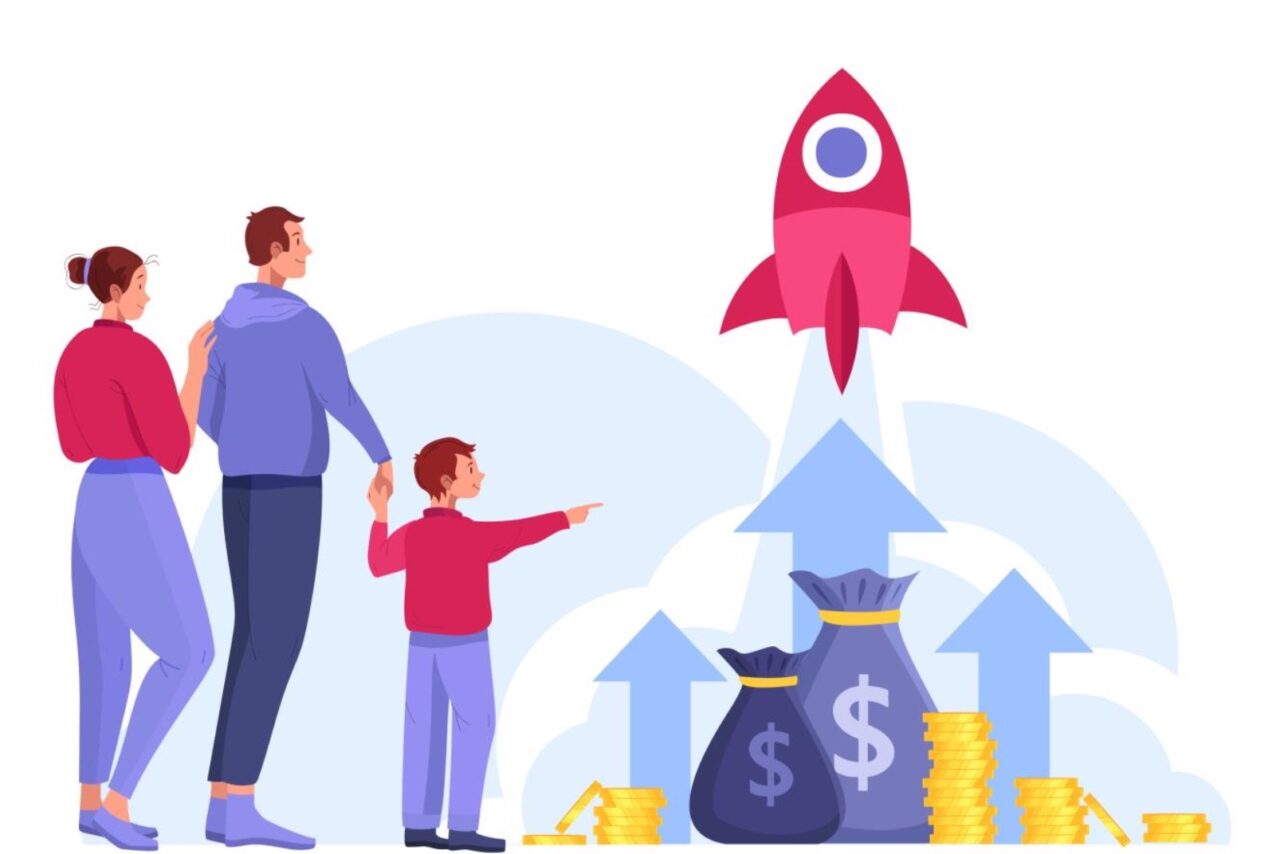Introduction
Since the pandemic, poor economic sentiment has been a consistent theme in every Navigator survey. Even with unquestionably positive economic indicators in the news –– including low unemployment, cooling inflation, and news of a soft landing –– perceptions of the economy continue to be negative, in large part due to persistent concerns about rising costs and a lack of confidence in people’s personal financial situations. While this disconnect is a challenge, it also represents an opportunity: Americans are looking for answers, and while they embrace progressive policy solutions in theory, there is a lack of awareness about what progressives stand for that needs to be rectified. We also consistently find that Americans want more investment, not less, in public programs and support taxing the wealthy and corporations to do just that, which is precisely at the heart of what is driving some of the positive economic indicators we are seeing.
Below, we make the case for what underlying values progressives need to keep in mind and uplift when communicating in their messaging about the economy based on findings from a year’s worth of Navigator surveys and focus groups.
The Economy in the Short Run
If you were to ask someone how they think the economy is doing, chances are that most people – consistently, three in four – would say badly. This has been true since late 2022. Navigator surveys have shown Americans overwhelmingly view the economy negatively, with three in five feeling uneasy in regards to their personal finances and higher levels of uneasiness among those living in households earning less than $50,000 per year. Given widespread negative sentiment, it is unsurprising that for twelve straight months, Americans have said the top issue Congress should be focusing on is inflation, closely followed by jobs and the economy.
If we were to take a snapshot of this time last year, headlines highlighted the price pains Americans were feeling at gas stations and in checkout lines in grocery stores. Inflation was soaring, paychecks were not stretching as far as they used to, and every focus group we conducted started with people expressing concern about rising prices. News articles from late 2022 predicted an upcoming recession, including an article from Bloomberg that placed the likelihood of a recession at 100 percent.
A year later, we see that inflation is slowing down, gas prices (though still relatively high) are significantly lower than last year, and unemployment is at a historic low. Still, three in four people will say the economy is bad, with half of Americans believing that we are either currently in or heading into a recession.
So how can we explain negative sentiment on the economy despite massive economic strides? It’s important to remember that when people rate the economy, they lead with their pain points. A 2019 Pew Research report found that Americans assessed the economy based on income, job availability, and the cost of healthcare – with less than half saying they looked at consumer prices, and only one in five middle-income Americans who felt gas prices affected their financial wellbeing. This is a stark contrast to now: Americans currently assess the health of the economy on grocery and gas prices, and given 78 percent of middle-income Americans reported in a survey last month that the cost of gas is where they are feeling the impact of rising prices the most, the fact their personal outlook on the economy remains so low makes sense.
Even more so, inflation is a tricky pain-point because ease of inflation means that prices are still rising, just not as fast. For the everyday American, conquering inflation doesn’t mean that you simply slowed it down, but stopped it entirely and reversed prices so that the cost of eggs can go back to what it was before mayhem.
The Economy in the Long Run
The goal of some Navigator focus groups conducted in April among young men of color was to understand how younger Americans are defining themselves within the current economy, in part because they rate economic issues even higher than the public overall as their top priority. When asked who is winning in the economy, most said corporations and corporate executives, citing the record breaking profits they have been raking in in juxtaposition to the back-breaking inflation everyday Americans are facing. One said the group of “winners” was becoming increasingly small. Moreover, many of the participants revealed that they are not where they thought they would be financially at this time in their lives. Many expected to be homeowners or well on their way to owning a home, and now find property ownership is not even a remote possibility. One even had to move in with family members because they were unable to make rent. Many felt that it must have been easier for their parents’ generation because now it feels difficult to succeed in this economy. In another focus group conducted this past June, participants expressed great personal concern for the economy, notably with a school teacher having no idea if or when she will be able to retire.
Economic hardship finds itself in tandem with a moment of reflection, of calling into question how well the underlying economic system is working. A Navigator survey conducted in early March found Americans are evenly split in assessing how well capitalism is working today (net -1; 41 percent working well – 42 percent not working well), a significant decline from when the same question was asked in 2019 (net +26; 55 percent well – 29 percent not well). This decline is largely driven by independents (from net +28 in 2019 to net -4) as well as Republicans (from net +64 in 2019 to evenly split today, 43 percent well – 43 percent not well).
In this spirit of reflection, a Navigator message test demonstrated Americans agree more with the statement that “we need to ensure the economy works for everyone, because right now it’s just wealthy people at the top getting richer, while people who work for a living are falling further behind” over a conservative argument that “we cannot afford to move towards socialism because it will ruin our economy… right now, capitalism is working: unemployment is at a historic low, and we should not do anything that could make inflation worse” (63 percent economy that works for everyone – 37 percent capitalism is working). The lived experience of a global pandemic, supply chain disruptions, and this sustained period of rising costs have undeniably left many Americans questioning the system and searching for answers for how they can keep up — if not get just a little bit ahead — after so much economic hardship.
How we define success is also changing. In 2019, a Navigator open-ended question found most Americans measured economic success through the “stock market” or “unemployment” metrics, as opposed to now where focus group participants in 2023 from across the country say they measure economic success by the affordability of goods and services and how their friends and family are faring. We measure success through what we value. When we say we assess economic strength based on stock market performance, we are saying we value corporate success above all, but when we use our paycheck and our family members as an indicator, we are saying we value personal economic freedom above all else. Keeping this top of mind should be paramount when communicating about the economy, because when there is so much focus on pointing to macroeconomic trends, the discordance with peoples’ lived experience can make that positive news lack credibility entirely. In this time of hardship, with the stark contrast between record breaking bonus checks for executives and the reality of the 60 percent of Americans who are worried about affording their lives, we see a transition in peoples’ economic values – whether intellectually or intuitively, people know that it is no longer true that “if you work hard and play by the rules, anyone can make it in America.” And, when we discuss the economy we need to be ready to make that distinction – the economy as it currently stands is rigged.
So the vibes aren’t great. What do we want?
Americans have not only a negative view of the economy, but have serious doubts about our entire system — which begs the question: what do Americans want for their economy? Following the 2022 midterm elections, Navigator conducted a post-election survey of over 5,000 Americans who voted in the midterms. After investigating what was top of mind for them heading to the ballot box, we asked these respondents to evaluate their preference between a more conservative worldview and a progressive worldview on about twenty different issues. Our goal was to create different spectrums of the electorate based on issues like the economy, social and cultural issues, public safety, and political extremism, and let us understand what solutions Americans truly believe are better for the country absent of partisan sorting. As the general atmosphere of hostility that increased political polarization so often provides, we assume (at least I assumed before the survey finished fielding) that most questions would basically split 50-50. The results found that we stand so much closer than we think, and our values are clear: we want to protect the economically vulnerable and ensure economic growth by investing more in the middle class.
Exhibit A: 84 percent of Americans believe Social Security and Medicare represent a promise to our seniors of a secure retirement and that we must protect these programs, while only 16 percent feel we need to cut or privatize the programs to secure their future. Let me repeat that: 84 percent — which is nearly the same as nearly four and a half out of the five people you talk to — believe that Social Security is and should be protected and invested in.
Exhibit B: 61 percent of Americans feel the wealthiest Americans and big corporations should pay more in taxes so we can invest in the middle class and working people – compared to 39 percent who believe raising taxes will slow the economy. Further, our research on the shutdown and debt ceiling from the summer found that 82 percent of Americans prefer to raise taxes on the wealthy compared to only 7 percent who would prefer to cut spending on social programs.
What we found in totality is that about half of the electorate fell on the progressive end of both economic and non-economic issues. Outside of this post-election survey, a Navigator survey conducted in June provided a list of government funded entities and asked participants to assess if they believed if we spend too much or too little on the programs. The top five most underfunded programs were believed to be:
- Benefits for veterans (70 percent too little – 5 percent too much);
- Helping people afford the basics (68 percent too little – 12 percent too much);
- Tax cuts for middle and working class families (65 percent too little – 11 percent too much);
- Retirement programs, like Social Security and Medicare (64 percent too little – 8 percent too much); and,
- Reducing child poverty (64 percent too little – 9 percent too much).
In this same survey, the area where the government is seen as spending too much was none other than… tax cuts for large corporations (19 percent too little – 51 percent too much). It’s clear that Americans support social programs and want increased spending on these programs. So, why do Americans trust Republicans – who famously want to slash spending on social programs – more than Democrats on economic issues?
Party Trust on the Economy
In every Navigator survey, we provide respondents a list of issues and ask them to indicate which party they trust more to handle each one. Time and time again, Republicans are more trusted on the issues of inflation and jobs and the economy, but to be clear: party trust and clarity around economic messaging does not indicate that Americans think that Republicans have better ideas on the economy. Our post-election survey found that one of the top issues for Americans entering the midterms was the economy, yet research has also diagnosed that most Americans believe neither party has a better idea on how to handle inflation (55 percent).
Despite being trusted less on the economy overall, our findings show that Democrats consistently have more trust in components of a variety of issues related to the economy, including health care (net +15), abortion (net +15), deciding what tax rates must be paid by multi-millionaires (net +14),student loans (net +9),looking out for people who work for a living (net +8), deciding what tax rates must be paid by middle-class Americans (net +6). improving wages for American workers (net +5), Social Security and Medicare (net +8), and by a 2-point margin trusting Democrats on growing the middle class.
If we dig a little deeper, Navigator has found that Republican-led legislation such as the Fair Tax Act and the Republican-led tax plan announced in February are widely unpopular. The Fair Tax Act, “which would eliminate all income and payroll, estate, and gift taxes and replace them with a 30 percent national sales tax on everything you buy,” was underwater by 25 points (28 percent support – 53 percent oppose), including among Republicans (net -6). Opposition significantly grew to 42 points underwater when adding the context that “the wealthiest Americans would receive a massive tax cut while the amount all other Americans would have to pay for … would go up 30 percent” (22 percent support – 64 percent oppose), including opposition among Republicans which rose to net -28. Our research on the Republican tax plan earlier this summer found a myriad of its provisions to be very concerning to the public, including cuts to Medicaid (74 percent concerning, 58 percent very concerning), taking away funding from K-12 public education (73 percent concerning, 55 percent very concerning), and reducing the debt by cutting help for working families (71 percent concerning, 52 percent very concerning).
Conversely, the Inflation Reduction Act passed by congressional Democrats and signed into law by President Biden is immensely popular, with consistent support from two in three Americans. The most popular parts of the legislation include capping insulin costs for seniors at $35 per month (82 percent support), giving Medicare the power to negotiate drug prices (81 percent support), and providing tax incentives to create more manufacturing jobs in the United States (79 percent). A survey in late September of this year found outstanding support for Medicare’s drug price negotiating powers when framed as: “As a part of the Inflation Reduction Act, Medicare now has the power to negotiate for lower prescription drug prices for the first time, reducing prices for prescription drugs” (net +75, including 79 percent support among independents). So how does one explain this seeming paradox of higher trust for conservatives on the issue while being more favorable to progressive economic policies?
The challenge is that there is an abundance of evidence that Americans do not know what Democratic policy priorities are in terms of the economy, and Republicans are more associated with the economy. A Navigator focus group conducted in June among independents in Arizona, Wisconsin, and upstate New York found that the Republican vision for the economy is clearer than the Democratic vision. When asked what Republicans’ vision for the economy is, participants quickly said “reign in spending” while another one said “get a handle on handouts and reduce taxes.” However, when asked about the Democratic vision for the economy, the question was met with moments of silence. One participant answered: “I feel like their vision isn’t as focused on the financial landscape… They’re more focused on social issues.” A survey conducted in early September found Americans feel Republicans are more focused than Biden and Democrats on inflation (net +9; 45 percent Republicans – 36 percent Biden/Democrats) and the economy (net +5; 44 percent Republicans – 39 percent Biden/Democrats).
Moreover, in our most recent survey, we tested ten accomplishments of the Biden administration and found that all of them earned support from at least three in five Americans, but only a majority had heard “some” about just two of them, and just a quarter had heard “a lot” about them: lowering the cost of prescription drugs by allowing Medicare to negotiate for lower prescription drug costs and capped insulin costs for seniors to $35 a month (77 percent support, but just 57 percent had heard at least “some” and only 25 percent had heard “a lot”) and passing a bipartisan law to rebuild roads and bridges, expand power infrastructure, increase passenger rail access, expand broadband access, and improve water infrastructure (73 percent support, but just 54 percent had heard at least “some” and only 22 percent had heard “a lot”).
The June focus group highlighted another issue: what do Americans leave out when they think about the economy? Americans leave out health care, Social Security and Medicare, and abortion when they think and talk about the economy – all issues on which more Americans believe Democrats are more focused than Republicans. Part of gaining ground on economic trust involves altering how we define the economy to ensure we include issues like health care and the affordability of education. Progressives need to remind Americans that interactions in which each individual spends money is not only a part of the economy but the heart of it. Broadening the definition of the economy will intertwine issues to which Democrats are intrinsically more trusted and further reinforce the centering of the individual in defining economic success, and is a reminder that single mothers, low-income families, and often-overlooked groups are critical parts of the economy, and their success — driven by government investment — is the key to sustained economic growth.
A Progressive Vision for Tomorrow’s Economy
I once had an economics professor say the state of the economy was one of the main drivers determining if Americans would re-elect an incumbent President. I don’t have an exact Navigator data point to back-up this claim, but what I can say is economic growth and opportunity lies in the heart of the American identity. According to scholar Andre Yarrow, the post-World War II era was followed by a period of economic success which came to represent the evidence of the rebound of the U.S after years of rationing and loss due to the war. In fact, President Eisenhower said the main goal of the government was to “maintain a strong and growing economy” and this sentiment spreads to “the American Dream.” Though not often talked about today, it is the assumption each of us carry that we can define our economic success and expect malleability in the ability to move up the ladder of personal economic growth. So when the economy is hurting, when our money is draining due to rising prices and factors so beyond our control, and our faith in our government dwindles.
Last October, we held focus groups among strong Democrats in Pennsylvania, less strong Democrats in North Carolina, and independents who lean Democrat in Arizona. One of the questions we asked was “what is the Democratic Party for?” One of the themes that emerged was investment. Some said “investment infrastructure,” that they “promote growth of unions,” and were “more empathetic to the average person.” Further in the group we asked, if you had to say what animal best represents the Democratic Party, many responded “dog” or “dolphin” – all accompanied with the explanation that Democrats care. Absent message testing, education, or additional context given, the Democratic Party brand was seen as “caring.” The Democratic Party cares about the individual, the working class, and vulnerable families. So how does care translate into cohesive economic messaging and increased trust in the economy?
Progressives are, at their core, valuing individual experiences and the ability to provide for ourselves and for our families. We see this amid the SAG-AFTRA strike and the United Auto Workers strike as most Americans support unions’ right to organize and fight for better pay. We see it as Americans increasingly favor Medicare reforms that increase taxation on the wealthy. We see it where Americans are holding corporations responsible for increased gas prices. If progressives are increasingly seen as valuing individual success, then Americans are looking more toward their government to invest in individual success – which most Americans have made clear that they want more investment in programs that help middle and working class families, not less.
Progressives are met with a moment in which we can capitalize and highlight all of our economic legislative accomplishments, such as making student loans more affordable, capping the price of insulin, and investing in clean energy. While also having strong support for creating a universal paid family, and making corporations and the wealthiest pay higher tax rates, all of which show that we care about the individual. This stands in stark contrast with the lack of Republican ideas or legislation that matches that level of investment. In changing expectations, progressives need to demonstrate they are meeting the moment while conservatives continue to stray farther. Progressives must draw a clear division between our road map of individual investment and how that leads to economic growth, and that they stand for the economic freedom for every American family and their own self-determination.
